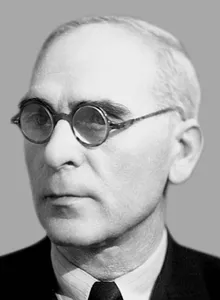
Dmytro Balatskyi (26 October 1902, Haisyn - 15 March 1981, Poltava) was a Ukrainian choral conductor, one of the founders of the Zirka (Haisyn) and Khoransu (Kyiv) chapels, artistic director of the exemplary bandura chapel, choral chapels of the Odesa and Poltava philharmonic societies, and author of the musical arrangement for bandura for the song "Unharness, boys, the horses".
He was born in Haisyn, where he led an amateur choir as a young man. He received his professional education at the Kyiv Music and Drama Institute (1929).
He was the director of the State Bandura Choir (from 1937). He was arrested on 1 September 1938 for "actively conducting anti-Soviet agitation, spreading provocative rumours, and participating in a counter-revolutionary organisation". At a special meeting of the NKVD on 21 October 1938, in case 1615086, he was sentenced to imprisonment in the concentration camps of Kazakhstan for 5 years under Articles 54-10 and 54-11 of the Criminal Code of the Ukrainian SSR. Dmytro Balatsky was one of the few bandura players who showed great courage during interrogations, not pleading guilty and not slandering any of his friends or colleagues. In 1939, he filed an appeal against his sentence, which was rejected.
After returning from exile, he eventually got a job as an artistic director at the Odesa Philharmonic (1947-1948). In 1949, he was appointed to the position of the director of the Regional Philharmonic Choir in Poltava. For more than 20 years, he directed the male vocal ensemble of the Philharmonic Music School. He also taught at an evening music school and directed workers' choirs.
Creative work
The repertoires of all the choirs led by Dmytro Balatskyi in the 50s and 70s of the XX century necessarily included works by Taras Shevchenko. He cared about the popularisation of Ukrainian songs. He is the author of the music "Unharness, boys, the horses".
Honouring the memory
Maksym Rylskyi dedicated his poem "Beethoven" (1932) to Balatskyi. One of the streets in Poltava is named after Dmytro Balatskyi.

